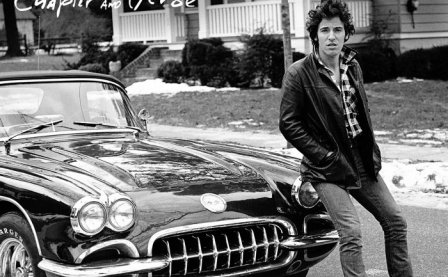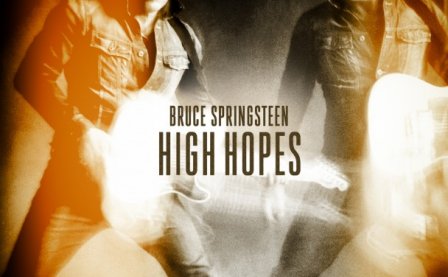Back in March of 2012, America was preparing once more to ramp its constant, slow-burning partisan warfare into an election-year orgiastic frenzy when Springsteen dropped Wrecking Ball. Beneath the bristle of working-class outrage that informed the album lay an appeal to the compassion and humanity that remains this country’s greatest strength. With his trademark mixture of stern reproval and unshakeable faith in Americans’ resilience and decency, Springsteen offered a refreshing antidote to the cynicism and political gamesmanship that dominated the last (and, indeed, every) election cycle.
But while Wrecking Ball was an album for a specific moment in time, High Hopes would seem to be an album for time-out-of-joint. Its 12 tracks form a Frankenstein’s monster of covers, re-imaginings of old favorites, and outtakes stretching all the way back to the 90s. Adding an extra layer of strangeness is the participation of Rage Against the Machine’s Tom Morello, who joined the band to fill in for Steve Van Zandt on the Australian leg of the tour and became Springsteen’s “muse” as the album came together.
Considering its motley origins, the whole thing hangs together pretty well. Some of the credit for that is due to Morello, who contributes to eight of the songs here. While regularly recognized as one of the most talented and distinctive guitarists of his generation, he’s also a surprisingly pliable one, and here again he contorts his form amoeba-like to wrap around and digest Springsteen’s aesthetic. His squeaks and squalls dot the title track (a reprise of a cover of an original by The Havalinas), and the song builds to a whammy’d-out, Gang of Four-esque anti-solo. Oftentimes, especially on gentler offerings like “American Skin (41 Shots)” and “Hunter of Invisible Game,” he blends in so seamlessly you forget he’s there. The only time his presence becomes a distraction is on their reimagining of Springsteen (and later, RatM) classic, “Ghost of Tom Joad,” wherein he manages to recycle pieces of his solos from both “Like a Stone” and “Bulls on Parade,” forcing an already self-referential choice into the shape of some kind of flannel-clad Ouroboros (that said, my inner 12-year-old still lit up like a Christmas tree).
Springsteen refers to the contents of the album as some of his “best unreleased material from the past decade,” and there’s a little something to that. A few of these songs have been knocking around the internet in studio-outtake form and in live concert footage for so long that they’ll feel like old hat to the Springsteen die-hards. “American Skin” is probably one of the most famous, a tribute to Amadou Diallo, who was gunned down in 1999 by police officers who mistook his wallet for a gun. Given how little has changed since then, it’s no surprise to see this one get the proper album treatment this year. Like many of lesser-known chestnuts on this album, the song enjoys a richness of detail that we’ve started to miss from The Boss. One of my personal favorites is Rising outtake “Harry’s Place,” a seedy, noir-ish sketch that recalls some of the grittier illustrations of city life from Springsteen’s early career. “Harry” exists in a backdrop of urban decay of which he is the undisputed master. He is described fleetingly in the song and almost exclusively through the things he owns: houses, cars, women, streets — in effect, everything around him. It’s the sort of visceral storytelling that often gets sacrificed to the crusader spirit of the more message-driven output of Springsteen’s later career.
Equally of interest is his choice of covers. One of the least discussed aspects of Springsteen’s career is the fact that his rise to fame ran parallel with the emergence of punk in the US, and how those lines occasionally intersected, as when he passed “Because the Night” on to Patti Smith to make her own or made a walk-on appearance in Lou Reed’s epic “Street Hassle.” High Hopes contains cuts from two of punk’s earliest pioneers, Antipodean proto-punks The Saints and godfathers of no-wave and synth punk, Suicide. Of course, The Saints’ “Just Like Fire Would,” isn’t exactly “I’m Stranded” — in fact, it’s about as close as you can get to sounding like a Bruce Springsteen song without going all John Cougar Mellencamp, but it’s no less enjoyable for that fact. The bigger treat, though, would have to be “Dream Baby Dream,” a song that’s been gracing Springsteen’s live shows for going on 10 years now. Springsteen manages to expand the arrangement for his full band without cluttering the serene simplicity of the original.
Odds-and-bobs collections like this are generally only of interest to super fans, and High Hopes is no different. The selections run the predictable gamut of great to interesting to wholly disposable, but the breadth of material here nonetheless reaffirms Springsteen’s talents as a songwriter and interpreter of others’ work. High Hopes is undoubtedly a stopover between “proper albums” for The Boss, but it’s a stopover with more than a few worthwhile sites to enjoy in the meantime.
More about: Bruce Springsteen




